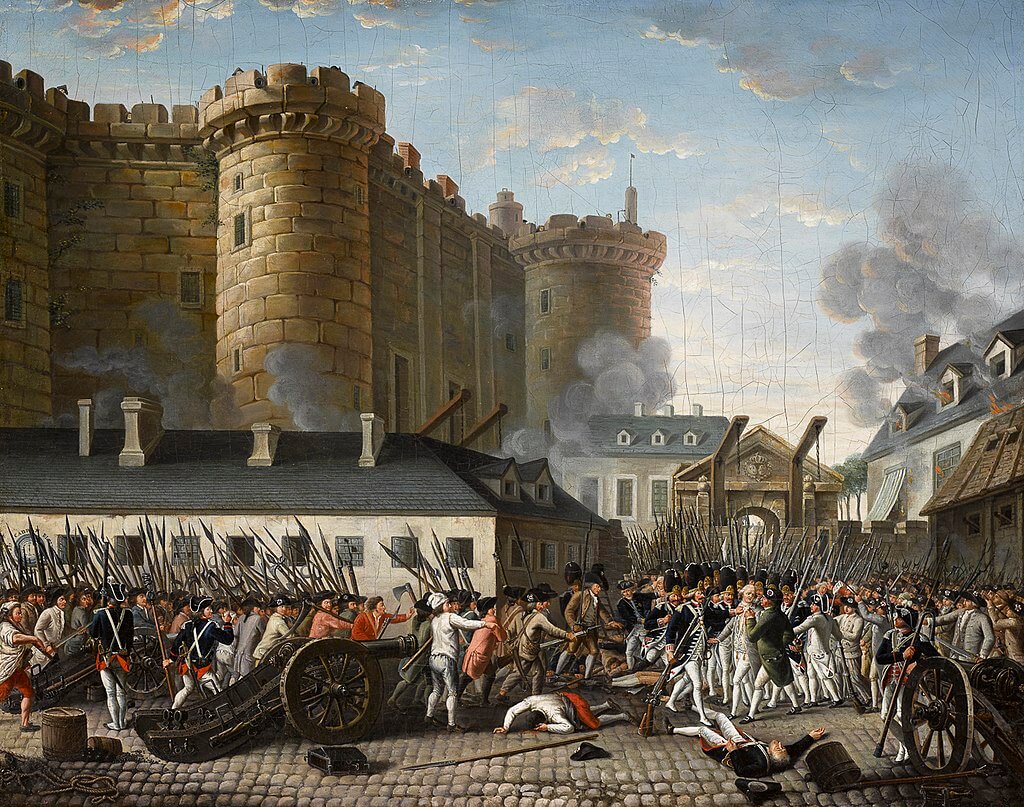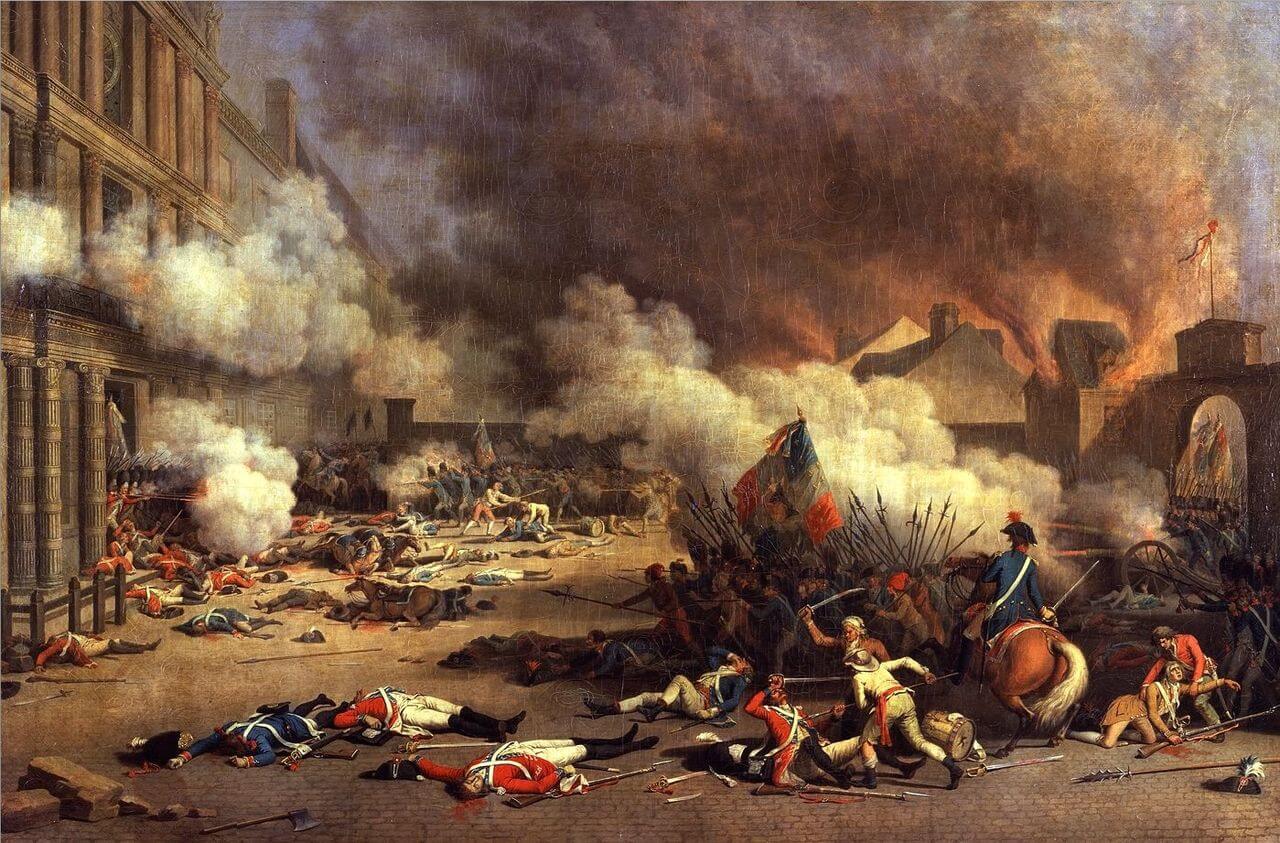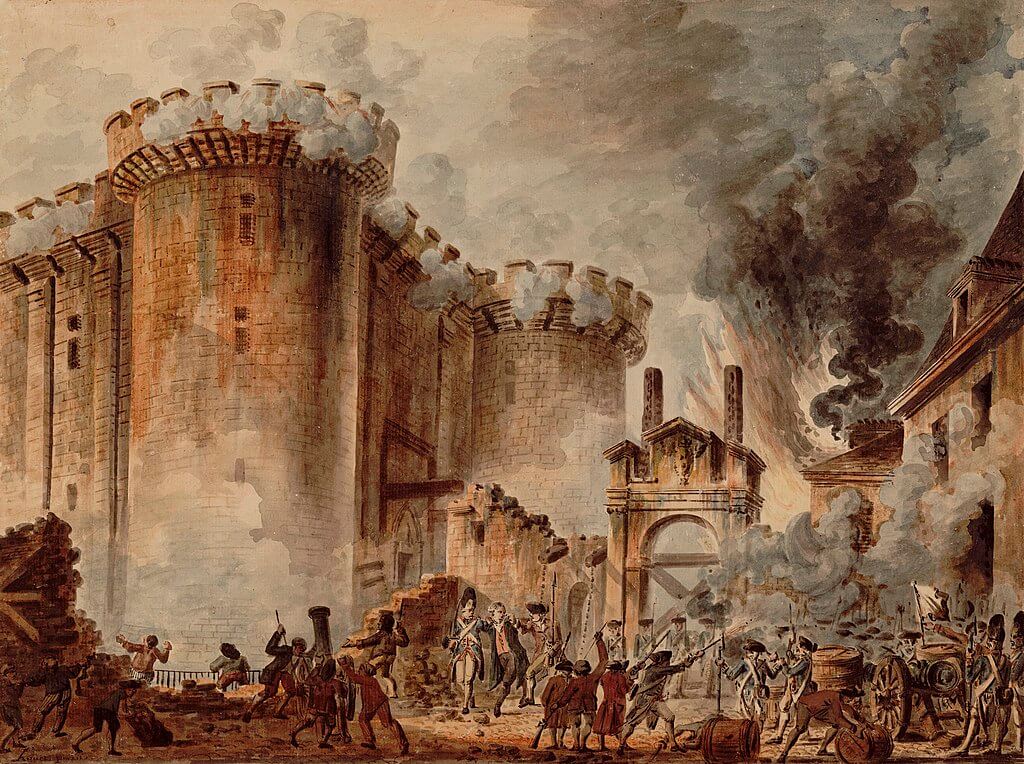Why did French Revolution happen? What is the background and causes of French Revolution? What are the reasons?
FRENCH REVOLUTION, a European political convulsion with social and cultural consequences, which began in France toward the end of the 18th century. It profoundly affected all of Europe and left marks on the Middle East, India, North and South America, and other parts of the globe that Europeans explored, colonized, and exploited.
Though the Revolution is traditionally dated from 1789, its first phase in fact opened in 1787. And, though historians recognize a French Revolutionary period that ended in 1799 or 1815, it cannot be said that the revolutionary struggle or movement ended at all. What the Revolution established during the 1790’s in large part survived. The Napoleonic regime, though governing despotically, preserved many revolutionary reforms and imposed revolutionary institutions and creeds outside France. The so-called Restoration of 1814-1815 was meant to halt revolutionary change, but its sponsors had to accept many of the Revolution’s innovations. From 1815 to 1850, moreover, revolutionaries in many parts of Europe fought to realize goals that Frenchmen had pursued in 1789 and in 1793-1794. As a movement, the French Revolution continued into the 19th century. The agitation it began never died but blended into political and ideological conflicts of later times.

Source : wikipedi.org
CAUSES OF THE REVOLUTION
Historians disagree on the causes of the French Revolution. The two most celebrated interpretations are losing ground. The idea that the rationalism of the Enlightenment generated the revolutionary movement in France is under attack from many sides. Skeptics argue, for example, that the Enlightenment philosophers did not anticipate or recommend a revolution, that
their ideas were not widely disseminated in society, and that the public capable of responding sympathetically to their thought was too small to account for what happened in 1789. Also, the Revolution began two decades after the political thought of the Enlightenment had reached its maturity, and the revolutionary state of mind that overwhelmed the ancien régime was shaped by a political crisis that the Enlightenment did not cause. No doubt, once the Revolution began, its leaders found in writings of the Enlightenment the material with which they defined issues and articulated goals. It is also likely that the Enlightenment affected the way that political leaders familiar with it responded to political and social situations. But it has become increasingly difficult to believe that the Enlightenment caused the French Revolution.
A second interpretation now losing credibility is the Marxist doctrine that a capitalist bourgeoisie, growing in numbers and self-consciousness as capitalism matured, smashed the institutions of an aristocratic-feudal society and replaced them with others better suited to capitalism and bourgeois power. The bourgeoisie thereby, according to the theory, restored the harmony between fact and law—between socioeconomic realities and political and legal arrangements. This interpretation fails because, as social historians have discovered, it is impossible to align the pro-revolutionary forces with capitalist wealth or the antirevolutionary forces with the kind of wealth characteristic of aristocracy. In fact, the wealth of most well-to-do commoners and revolutionary activists had similar sources and was similar in type to that of most aristocrats—land, urban property, offices, and annuities.
Therefore the revolutionaries shared the same economic base as their victims. In the Estates General of 1789, the assembly summoned by King Louis XVI that defined the goals and rationale of the Revolution, 87% of the commoners (Third Estate) were not capitalists. It is also true that a substantial minority of nobles were heavily involved in capitalist ventures like mines, canals, and metallurgical enterprises. In addition, several merchants, bankers, and financiers had acquired noble status, and many commoners owned seignorial or “feudal” properties. The economic cleavage between capitalism and non-capitalism cannot, therefore, be reconciled with the political cleavages of the Revolution, nor can the leaders of the Revolution be identified with a social class that played a capitalist role in the relations of production. The class-struggle thesis in its Marxist form is not consistent with the realities and fails to explain what actually happened.

Source : wikipedi.org
The most promising hypothesis is that the Revolution of 1789 emerged from a political crisis that coincided with an economic breakdown. Both were essential to what happened. The political crisis was caused by the near-bank-ruptcy of the state. Beginning in 1787, it produced an Estates General determined to convert the absolute state into a constitutional monarchy. The economic breakdown generated unrest and riots that undermined the discipline of the army, defeated efforts to restore order, dramatized the need for change, and reinforced the convictions of the revolutionary leaders. The fact that the political crisis and the economic breakdown occurred at the same time is coincidental.
The Revolution was not a product of long-considered philosophic intentions and social movements but a response, momentous and impressive, to a public disaster. By recognizing that the Revolution was not premeditated and that its purposefulness was largely read into it later, this hypothesis realigns the interpretation with the record. It also explains better than cfcher hypotheses not only why the Revolution happened but also why it occurred when and where it did and at no other time or place. For France was the only European state in which a political crisis coincided with an economic collapse and the only one in which a revolution of real magnitude took shape in response to internal pressures alone.
REVOLUTION IN THE MAKING, 1787-1789
The political crisis, which appeared in 1787, produced two distinct revolutionary movements in France. The first, which was aristocratic, aimed at subjecting the monarchy to the rule of traditional noble and patrician bodies, chiefly the Estates General. The second, which was democratic, was a reaction against the first. Far more radical in conception, it envisioned an entirely new political structure, designed on new principles, that would execute the will of the people and would in theory be free of the political inequalities, based on birth and status, that characterized the ancien regime.
The aristocratic revolution had precedents. The monarchy had always been troubled by aristocratic resistance, actual or potential, and from 1763 onward aristocratic groups repeatedly blocked reforms that damaged their interests and forced the resignation of ministers who opposed aristocratic privilege. But the democratic movement was an innovation. It began in the winter of 1788 as a reaction, without benefit of theory, against the order that the aristocracy seemed about to impose. Lacking a tradition in French history, its partisans had to invent or discover a rationale. They took ideas, often out of context, from the Enlightenment and from the American Revolution. It is doubtful whether their concepts and goals were fully articulated or widely disseminated before the late spring of 1789. The Declaration of the Rights of Man and the Citizen, adopted on Aug. 26, 1789, ended the search for a democratic ideology and gave the revolutionary leaders a basis for educating their fellow citizens in die principles of the liberal-democratic state.
The Political Crisis.
In order to understand how the political crisis of 1787-1789 produced these two revolutions it is necessary to review the period’s main events. The crisis began with a financial failure that brought the state close to stopping treasury payments and forced it to plan reforms and new taxes that would harm the interests of nobles, clergy, and privileged provinces and towns. In order to outflank aristocratic resistance to this reform program, the government tried to get it endorsed by an “Assembly of Notables.” But the effect of revealing to the Notables that royal finance had been mismanaged was to discredit die existing regime and intensify the hostility of the aristocracy.
Failing to secure the support of the Notables, the government tried to impose the reforms and new taxes by decree. But the 13 parlements, which were sovereign courts of appeal staffed primarily with nobles, refused to register or to enforce the decrees. Instead, the parlements led the aristocracy and other politically active sectors in a struggle against the crown, demonstrating to the lower orders that the government was weak and that the aristocracy considered it no crime to defy King Louis XVI. This struggle, which lasted from May 1787 to August 1788, was the aristocratic revolution. Its program was to reestablish the Estates General, dormant since 1614, as a parliament, controlled by the aristocracy, that would share power with the king. When the government had to suspend treasury payments in August 1788, the ministers surrendered. In order to obtain public sanction for new taxes, the King summoned the Estates General to meet in May 1789. The success of the aristocratic revolution seemed assured.

Source : wikipedi.org
The announcement that the Estates General would meet raised the unforeseen issue of how the three estates (clergy, nobility, and commoners) would be represented and how much power each would exercise. The discussion of this issue produced, in September 1788, a demand that the Third Estate, as the representative of the vast majority of the population, have as many votes as the clergy and aristocracy combined. The demand generated an increasingly militant movement and was the beginning of the democratic revolution. When the Estates General met in May 1789, the government had granted the Third Estate as many representatives as the other two orders combined; but it had not doubled its voting power, and it was over voting power that the first struggle of 1789 was fought. When the deputies of the Third Estate, supported by some of the clergy and nobility, converted the Estates General into a National Assembly in which each deputy had one vote, they affirmed the principle of the vote by head and asserted their right to give France a new constitution, in the name, not of the three estates, but of the people as a whole.By holding resolutely to their position in the Oath of the Tennis Court (June 20) and in the crisis of the July Days (July 12-14), which culminated in the attack on the Bastille, they established the democratic principle in France.
Economic Breakdown.
They would not have succeeded, however, without the accompanying economic disaster that disorganized society and paralyzed the government. The origins of this breakdown had little to do with those of the aristocratic and democratic revolutions. In general, it resulted from a retardation of French agricultural and industrial technology.
During the 18th century agricultural productivity remained constant, and production hardly rose at all, but from 1740 to 1790 the population grew by more than a third. The larger the population, the more peasants there were who clamored for land to lease. Under the circumstances, landlords nearly doubled rents, to the detriment of the peasant standard of living. In times of subnormal harvests, more people went hungry. The poor harvest of 1788 brought scarcities and high prices and caused the food riots of 1789. Vagrant peasants who left their homes for lack of food filled the roads and towns, adding to the tension.
The French textile industry, which employed over a million people, was suffering from competition from the Spanish, German, and Italian textile industries. In decline generally during the 1780’s, it fell into a massive depression when, beginning in 1787, British textiles were admitted to France practically without duty. Being cheaper and better than French textiles, they largely preempted the market and caused widespread unemployment. Spinners and weavers, many of them country people, joined the uprooted peasants on the roads and sought work and relief in the towns, which were centers of violence and disorder in 1789.
mavi